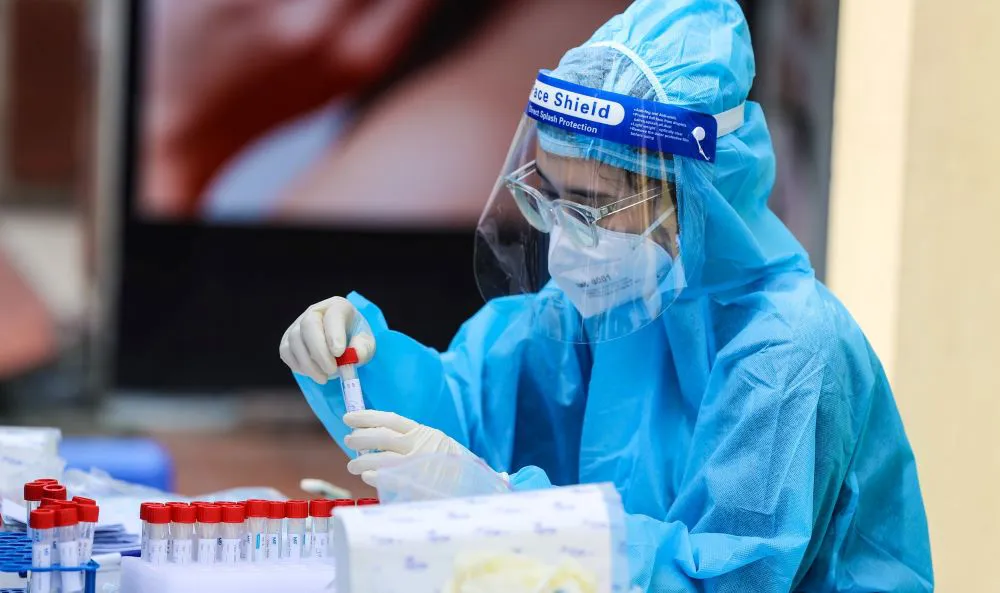Vietnam’s health ministry lowers Covid-19 test prices amid high demand
Imposing the price cap on test kits is necessary in the context of soaring infections across Vietnam.
Vietnam’s Ministry of Health (MoH) has issued the new ceiling price of Covid-19 tests, which takes effect from today [February 21].
According to the ministry’s recent circular, the new price cap on the rapid antigen test is VND78,000 (US$3.4) per kit, a reduction of up to 30% from the rate before.
The document also stipulates the prices for SAR-CoV-2 testing performed by the State-owned medical facilities, including sample collection, storage, testing, and delivery of test results.
For real-time polymerase chain reaction (RT-PCR) testing, the price cap is VND501,800 ($22), down 4% from that in the past. The pricing structure consists of the direct cost of taking and preserving samples, performing tests, and delivering results, plus remuneration for medical staff.
Meanwhile, Covid-19 testing using automated or semi-automated immunoassay analyzers is set at VND178,900 ($7.8) per test maximum, a slight drop from the previous price of VND186,600 ($8.1).
Covid-19 testing in Hanoi. Photo: Khanh Huy/ The Hanoi Times |
The pricing scheme is applied to the payment of SARS-CoV-2 testing costs in accordance with the law on health insurance. Those covered by it are people who pay out-of-pocket for the services, and those whose medical costs are covered by the State budget in line with the Law on Prevention and Control of Infectious Diseases.
In December 2021, the director of Viet A Technologies and several officials were arrested and prosecuted on charges of inflating the prices of RT-PCR test kits.
Vietnam’s new caseload has been on the sharp rise in the past few weeks, with the past seven-day average now reaching around 35,000.
Therefore, local residents’ demand for Covid-19 test kits is surging. Many people are confused by the chaotic prices and the quality of SARS-CoV-2 antigen rapid tests.
Associate Prof. Tran Dac Phu, senior advisor to the MoH's Public Health Emergency Operations Center told The Hanoi Times in a phone interview that people should buy rapid test kits from manufacturers that appear on a list authorized by the health ministry and displayed at accredited drug stores.
“The authorities, especially the health inspectors, need to strictly handle individuals and agencies which sell unlicensed medical products, in order to ensure the best quality products for users,” Phu stressed.
He added that the MoH has proposed to stabilize the prices of Covid-19 test kits and increase their supply by negotiating favorable deals with international manufacturers.
“The ministry took this decision after people complained that the prices in Vietnam were significantly higher than other countries. The prices of Covid-19 test kits depend on their origin, quality, quantity, and purchase date. During the height of community Covid-19 spread, rapid test kits were in short supply, causing their prices to skyrocket,” Phu noted.
He said the ministry has also encouraged local producers to negotiate the transfer of technology from producers in Europe and the US to make test kits in Vietnam. The ministry asked producers, importers and distributors to make public the prices of Covid-19 test kits.
Up to now, the health authorities have licensed 97 types of Covid-19 test kits, including 35 RT-PCR test kits, 39 antigen test kits, and 23 antibody test kits. Eighty-four enterprises had reported prices for 186 types of test kits, according to a recent report by the MoH.
The report said the prices of testing services depend on many market factors, such as the countries of origin, time of order, and quantity. The price of test kits made in Asian countries is cheaper than those made in Europe and the US.
The MoH has also set up an inspection team to work with a number of localities to clarify and deal with the inconsistency in prices of test kits and testing services.












